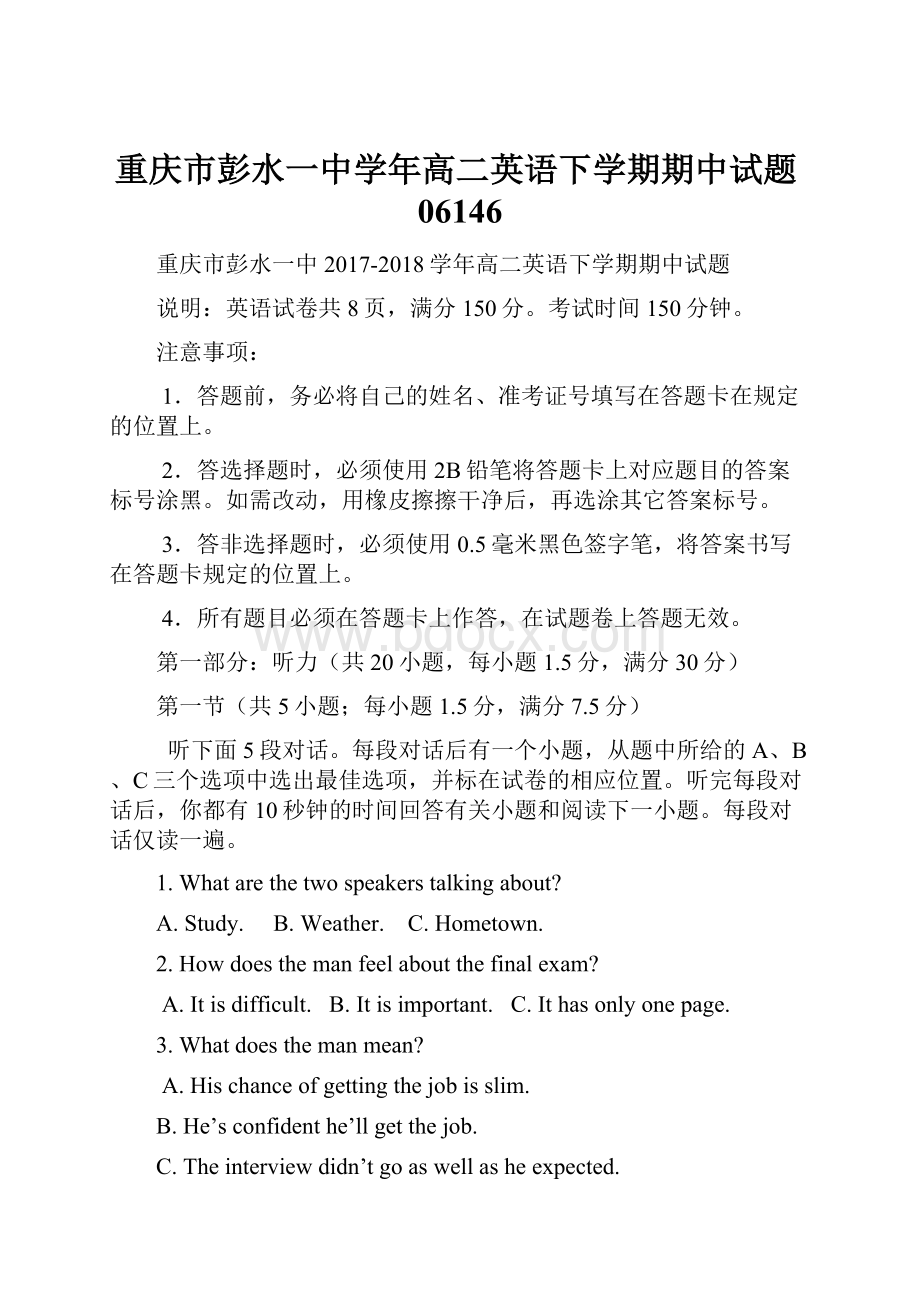重庆市彭水一中学年高二英语下学期期中试题06146.docx
《重庆市彭水一中学年高二英语下学期期中试题06146.docx》由会员分享,可在线阅读,更多相关《重庆市彭水一中学年高二英语下学期期中试题06146.docx(15页珍藏版)》请在冰豆网上搜索。

重庆市彭水一中学年高二英语下学期期中试题06146
重庆市彭水一中2017-2018学年高二英语下学期期中试题
说明:
英语试卷共8页,满分150分。
考试时间150分钟。
注意事项:
1.答题前,务必将自己的姓名、准考证号填写在答题卡在规定的位置上。
2.答选择题时,必须使用2B铅笔将答题卡上对应题目的答案标号涂黑。
如需改动,用橡皮擦擦干净后,再选涂其它答案标号。
3.答非选择题时,必须使用0.5毫米黑色签字笔,将答案书写在答题卡规定的位置上。
4.所有题目必须在答题卡上作答,在试题卷上答题无效。
第一部分:
听力(共20小题,每小题1.5分,满分30分)
第一节(共5小题;每小题1.5分,满分7.5分)
听下面5段对话。
每段对话后有一个小题,从题中所给的A、B、C三个选项中选出最佳选项,并标在试卷的相应位置。
听完每段对话后,你都有10秒钟的时间回答有关小题和阅读下一小题。
每段对话仅读一遍。
1.Whatarethetwospeakerstalkingabout?
A.Study.B.Weather.C.Hometown.
2.Howdoesthemanfeelaboutthefinalexam?
A.Itisdifficult.B.Itisimportant.C.Ithasonlyonepage.
3.Whatdoesthemanmean?
A.Hischanceofgettingthejobisslim.
B.He’sconfidenthe’llgetthejob.
C.Theinterviewdidn’tgoaswellasheexpected.
4.Whenwillthetwospeakersmeet?
A.At8:
00.B.At5:
45.C.At7:
15.
5.WhoisJudyprobably?
A.Theman’sformerneighbor.
B.Theman’sformercolleague.
C.Theman’sformerschoolmate.
第二节(共15小题;每小题1.5分,满分22.5分)
听第6段材料,回答第6-7题。
6.Whatseemstobethewoman’sproblem?
A.Hercarbrokedown.B.Shedidn’tfeelwell.C.Shelostherwallet.
7.Whereisthewomangoingnow?
A.Toherhome.B.Toataxicompany.C.Tothehospital.
听第7段材料,回答第8~9题。
8.HowdidthewomanlearnJapanese?
A.Shelearntitinschool.
B.SheoncewenttoJapan.
C.Shelearntitfromherfather.
9.HowlonghasthewomanbeeninChina?
A.For30years.B.For25years.C.For20years.
听第8段材料,回答第10~12题。
10.Whatisthemancomplainingabout?
A.Thereistoomuchnoise.
B.Thereistoomuchdust.
C.Thereistoomuchtraffic.
11.Whatdoweknowabouttheroadneartheman’shouse?
A.Itsconditionisnotgood.B.Itisbeingconstructed.
C.Ithascompletedtheconstruction.
12.Whatsuggestiondoesthewomangivetotheman?
A.Showingthetruthtothemedia.
B.Collectingmoneyfortheconstruction.
C.Holdinganeighborhoodmeeting.
听第9段材料,回答第13~16题。
13.Whatarethetwospeakersmainlytalkingabout?
A.Howtoselltheproductsoftheircompany.
B.Howtodealwithdifficultcallers.
C.Howtoanswercustomer’sphonecallsproperly.
14.What’stheprobablerelationshipbetweenthetwospeakers?
A.Classmates.B.Couple.C.Colleagues.
15.WhatkindofcompanyisDiana?
A.Clothing.B.Food.C.Tour.
16.Howisthewomanrequiredtoendacall?
A.Bypromisingtodosomething.
B.Byofferingsomethingthatsoundsinteresting.
C.Bywritingdowncustomers’names.
听第10段材料,回答第17~20题。
17.HowmuchdidthespeakerspendontheBrandVoyagertour?
A.$4,000.B.$3,000.C.$2,000.
18.Whatwasthespeakerdoinginawaitingroom?
A.Shewaslisteningtosomemusic.
B.Shewasseeingamovie.
C.Shewastakingsomephotos.
19.Wheredidthespeakerstartontheone-hourflighttour?
A.FromHooverDam.B.FromthegreatColoradoRiver.
C.Fromthesouthofthecanyon.
20.Whichofthefollowingdidthespeakerhaveduringthetour?
A.Asandwich.B.Somehotdrinks.C.Apieceofbread.
第二部分阅读理解(共两节,满分40分)
第一节(共10小题每小题2分满分30分)
阅读下列短文,从每题所给的四个选项(A、B、C和D)中选出最佳选项,并在答题卡上将该项涂黑。
A
WelcometoCapeTown---thecitythathaseverything!
AbouttwomilliontouristsvisitCapeTowneveryyear.Itisn’tthecapitalcity(that’sJohannesburg),buttheCapeTownisSouthAfrican’smostpopularcitywithtouristsforitsbeautifulviewsandsunnybeachestogreatshopping,CapeTownhassomethingforeveryone.InfactavacationinCapeTownisunforgettable!
Adventure&outdoors
Fortheoutdooradventureorsportsfan,CapeTownhasalotofactivitiesfromclimbingtodiving---allcombinedwithfantasticsettingandsunnyskies.
Watersports&diving
CapeTown’sbeachesareperfectforwatersports.Scubadivingisalsopopular.Themanyshipwrecks(失事船只)alongthecoastlineoffersomeexcellentdives.Themoreadventurousdivercaneventrysharkcage(鲨鱼笼)divingtogeteye-to-eyewithagreatwhite!
Ifyouaren’tsoadventurous,tryavisittoBouldersBeaches.It’spartofaprotectareafortheAfricanpenguin.Youcanwalkaroundonwoodenroadsandwatchthepenguinsintheirnaturalenvironment.It’sgreatforswimmingtoo,ifyoudon’tmindcomingface-to-facewithapenguinortwo!
CapeTown’sweatherispleasant.Insummer,it’sabout26℃(andremember,mid-summerhereisJanuary!
),andthewinnertemperaturesdon’tusuallyfallbelow10℃.Thelocalmoneyistherand.Thereareonehundredcentstoeveryrand.ThethreemainlanguagesareXhosa,EnglishandAfrikaans.ThpopulationofCapeTownisabout3.5.million.
21.WhatcanwelearnaboutCapeTown?
A.Itisunderdeveloped.B.ItisbiggerthanJohannesburg.
C.ItislessfamousthanPretoria.D.Itisawell-visitedcity
22.WhichofthefollowingisaspecialsightatBouldersBeach?
A.ShipwrecksB.PenguinsC.SharksD.Shops
23.Whatdoesthelastparagraphmainlytalkabout?
A.AfewfactsaboutCapeTown.B.Somesuggestionsfortourists.
C.ThebesttimetogotoCapeTown.D.ThereasonsforvisitingCapeTown.
B
Japanisstartingtoexperimentwithself-drivingbusesinrural(乡村的)communities,suchasthetownofNishikata,wheretheelderlyarelivingahardlifebecauseoffewerbusandtaxiservicesasthepopulationagesandbecomessmaller.
Theadvanceoftheself-drivingtechnologyismakingcitiessuchasParisandSingaporeexperimentwithsuchservices,whichcouldproveimportantinJapan,wherepopulationarenotonlygraying,butbecomingsmaller,inruralareas.
Japancouldstarttheself-drivingservicesforcommunitiesthatarefarfromcitiesby2020,iftheexperimentsbegunthismonthprovesuccessful.
Thegovernmentplanstoturnhighwayreststopsintocentersfromwhichtodrivetheelderlytomedicalandbankingservices.
“SmallertownsinJapanaregrayingevenfasterthancities,andtherearejustnotenoughworkerstodrivebusesandtaxis,”saidHiroshiNakajimaofmobilegamingsoftwaremakerDeheNACo.
Intheinitial(最初的)experiment,theelderlyofNishikataweresentfromaserviceareatosomeorganizationsprovidinghealthcareservices.
“IworryaboutnotbeingabletogooutwhenIamnolongerabletodrive,”saidonetestrider,ShuzeYuzawa,addingthatshewouldbeopentousingsuchservices.
Thetestalsocheckedthevehicle’ssafetyinroadconditions,andifthosecrossingitspathwouldreacttothewarningitgives.
Theride,ataspeedofabout10kilometersperhour,feltcomfortableandsafe,saidtesttakerMiekoShimazaki,71,buthe72-year-oldhusband,Susumu,said,“self-drivingcarscouldbeusefulinthefuture,butI’dliketoseethemgofaster,atleastat40kilometersperhour.”
24.WhyarediverlessbusesappearinginNishikata?
A.Nobodytherecandriveabus.B.Itspopulationisagingandfalling.
C.Peopletherewelcomenewthings.D.Peopletherecanhardlyaffordcars.
25.Whatdoesthegovernmentplantodo?
A.Providehealthcareservices.B.Trainmorebusandtaxidrivers.
C.Producemoreandmoredriverlesscars.D.Setupcenterspickinguppassengers.
26.WhatwasShizaYnzawa’sattitudetowardtheself-drivingservices?
A.Shewasinfavorofthem.B.Shewasdoubtfulaboutthem.
C.Shewasuncertainaboutthem.D.Shewasstronglyagainstthem.
27.Whichofthefollowingaboutself-drivingbusesdidSusumuthinkcouldimprove?
A.Theirspace.B.Theirsafety.
C.Theirspeed.D.Theirprice.
C
Parents,you’veworkedhardtoteachthemostimportantlifelessonstoyourlittleones.Youaskthemtosay“please”and“thankyou”,youremindthemtoeatwithaknifeandfork,andyounever,everletthempicktheirnoseinpublic.Butthere’soneimportantlessonthatyoumightbeforgetting--andit’snothingyoucancoverinasimpleconversation.
AccordingtoanewstudyinthejournalScience,babiesreceivemorethangenetics(基因)fromtheirparents.Theycanalsogetcertaingoodqualities,suchaspersistence(坚持不懈),bywatchinghowadultsbehave.ResearchersatMassachusettsInstituteofTechnologysaythatbabieswhowatchedanadultstruggle(努力)withandthentriumphoversomethingweremorelikelytoshowpersistencethemselveswhengivenanewtask.
TheteamatMITstudied262babiesbetweentheagesof13and18months.Theyplacestheminoneofthreesituations.Inthefirstone,theleadresearcherstruggledwithtwodifferenttoys’problemsbeforesolvingthem,lettingthethebabywatchwhileshedidso.Thesecondtime,theresearchersolvedtheproblemsbutdidnotstrugglewiththem.Andforthethirdscene,shedidnotdoanything.
Aftereachscene,theresearcherleftasmallmusicaltoywiththechild.Sheshowedthebabythatitcouldplaymusicbutdidnotteachthemhowtoturniton.Thebabieswhohadwatchedtheresearcherstrugglediscoveredandpressedthetoy’sbutton(按钮)amuchgreaternumberoftimesthanthoseinthelasttwogroups.Inotherwords,thebabiesdidnotcopywhattheyhadwatched;theylearnednottogiveup,instead.
Now,theresearchersareinterestedinfindingwhichwaysoftalkingwithbabiesinfluencethemthemost.Theyalsohopetoknowiftheresultscanworkintherealworld,aswellaswhetherthelessonofpersistencemightlastintoadulthood.
28.Whatimportantlessonmightparentsforget?
A.Askingtheirkidstobepolite.
B.Settinganexamplefortheirkids.
C.Teachingtheirkidsgoodtablemanners.
D.Usingproperwordsinfrontoftheirkids.
29.Whatdotheunderlinedwords“triumphover”inParagraph2mean?
A.SucceedatB.Lookat
C.SearchforD.Carefor
30.Whatdidthestudymainlyshow?
A.Babiesfinisheddifficulttasksthroughcopying.
B.Babieslearnedthevalueofpersistence.
C.Kidslearnedmostfromtheirparents.
D.Kidsaresmartertha